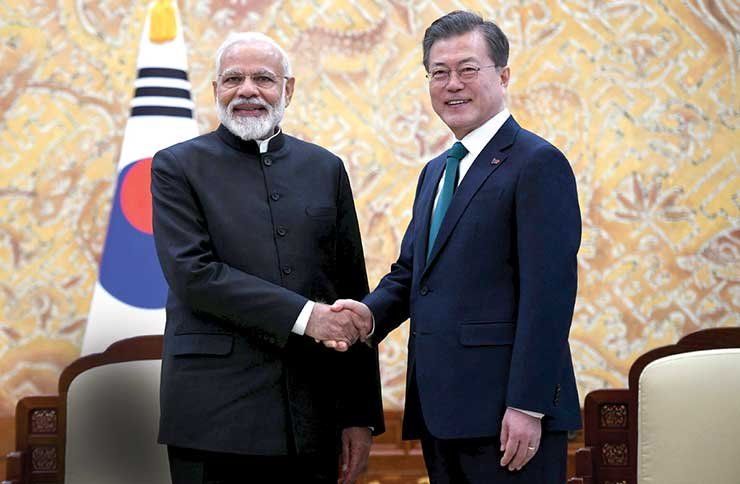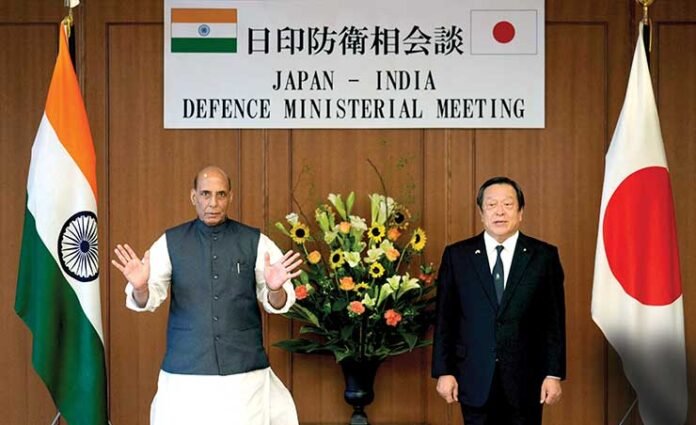India’s Act East Policy for the Southeast Asian and East Asian countries is pursued bilaterally and multilaterally to promote regionalism and maintain regional order and security. As a rising global power, India is strategically positioned to play a pivotal role in the Indo-Pacific Region. India intends to be the leading power and not just a balancing power in the region amidst the territorial claims and disputes in the South China Sea.
India must revitalise its defence capabilities to secure its interests and maintain regional stability. A strategic defence partnership with Japan, South Korea, and the Association of Southeast Asian Nations (ASEAN) presents a promising avenue for achieving this goal. This essay will explore the rationale behind such a defence partnership, the potential benefits for all parties involved, and the challenges that must be addressed.
Rationale for Re-energised Defence Partnership
The Indo-Pacific Region is increasingly becoming a geopolitical hotspot, characterised by rising tensions and China’s growing influence. India’s policy in this region focuses on inclusivity, openness, resilience and cooperation. A strong and capable defence is essential for India to protect its sovereignty, territorial integrity, and economic interests.
India and Japan share a ‘Special Strategic and Global Partnership’. The India-Japan Defence and Security partnership forms an integral pillar of bilateral ties. India-Japan defence exchanges have gained strength in recent years due to growing convergence on strategic matters. The significance of the partnership is growing from the common outlook on issues such as peace, security and stability of the Indo-Pacific Region. The 3rd India-Japan Defence and Foreign Ministerial meeting held on August 20, 2024, is a testament to the common strategic vision towards a free and open Indo-Pacific and support for ASEAN unity and centrality.
In this regard, regular joint service staff talks and joint military exercises were held. The 26th edition of maritime exercise Malabar-22 culminated in the seas off Japan on November 15, 2022. The first Bilateral Fighter Exercise Veer Guardian was held in Japan in January 2023. The Army-to-Army exercise; Exercise Dharma Guardian was held in Japan in February 2023 for the first time since its inception in 2018. Exercise Shinnyu Maitri was also conducted between the transport wings of IAF and Japan Air Self Defence Force (JASDF) in March 2023. The Japan-India Maritime Exercise (JIMEX) was conducted in the Bay of Bengal from July 5 to July 10, 2023. Both countries have further agreed to cooperate in emerging, key areas of unmanned ground vehicles, robotics and ship maintenance.
The Indo-Pacific Region is becoming a geopolitical hotspot, characterised by rising tensions and China’s growing influence. India’s policy in this region focuses on inclusivity, openness, resilience and cooperation. A strong and capable defence is essential for India to protect its sovereignty, territorial integrity, and economic interests
India and South Korea have fostered better defence relations in recent years. Seoul is ranked as India’s fifth-largest arms exporter over the five years from 2018 to 2022, accounting for 2.8 per cent of India’s total arms purchases, according to the Stockholm International Peace Research Institute. On October 1, 2022, the Indian destroyer — INS Sumedha — and the navy vessels Hansando and Dae Cheong of South Korea took part in an exercise in the Bay of Bengal as part of a maritime collaboration. In April 2018, a bilateral Coast Guard exercise ‘Sahyog-Hyeoblyeog’ was conducted near Chennai to improve maritime security in the Indian Ocean Region
The defence industrial alliance is on an upswing with the joint venture between Hanwha Aerospace of South Korea and Larsen & Toubro (L&T) of India to construct K-9 Vajra howitzers for the Indian Army. New Delhi and Seoul finalised the roadmap for defence industry cooperation in 2020. The roadmap also envisages promoting Korean investment in the newly established Industrial Corridors in Uttar Pradesh and Tamil Nadu. Further, Korea’s Daewoo Shipbuilding & Marine Engineering is a major contender for the construction of six Conventional Submarines for the Indian Navy under Project P 75 (I).
As a regional grouping, ASEAN plays a crucial role in the Indo-Pacific. Its member states have diverse security concerns but share a common interest in maintaining regional stability and peace. In November 2022, the first ASEAN–India Defence Ministers’ Informal Meeting was held in Cambodia on the sidelines of the ASEAN Defence Ministers’ Meeting Plus. The meeting was a clear message to Beijing that India wanted to step up its defence cooperation with ASEAN and its member states. On April 19, 2024, India delivered BrahMos missiles to the Philippines – the first batch of a US$375 million deal with Manila that will see New Delhi provide three batteries of the cruise missile to the Philippine Marine Corps. Dr S Jaishankar, India’s foreign minister stated publicly ‘India’s support to the Philippines for upholding its national sovereignty’. In 2023, for the first time, India called for ‘adherence’ to the 2016 Arbitral Award on the South China Sea.

Potential Benefits for All Parties
India’s strategic partnership with Japan, South Korea, and ASEAN can offer significant benefits for all parties involved.
The India-Japan Defence and Security partnership forms an integral pillar of bilateral ties. India-Japan defence exchanges have gained strength in recent years due to growing convergence on strategic matters. The significance of the partnership is growing from the common outlook on issues such as peace, security and stability of the Indo-Pacific Region
- Enhanced Security: By working together, India, Japan, South Korea, and ASEAN can strengthen their collective security capabilities and deter potential threats. Joint military exercises, intelligence sharing, and technology transfer can enhance their ability to respond to crises and protect their interests.
- Economic Prosperity: A more secure and stable Indo-Pacific Region is conducive to economic growth and development. By strengthening their defence partnerships, these countries can create a more favourable environment for trade, investment, and regional cooperation.
- Technological Advancement: India can benefit from the advanced military technologies and expertise of Japan and South Korea. This can help it modernise its armed forces and develop indigenous defence capabilities.
- Diplomatic Influence: A strong and influential India can play a more constructive role in regional and global affairs. By partnering with Japan, South Korea, and ASEAN, India can enhance its diplomatic standing and promote its vision of a free, open, and inclusive Indo-Pacific.
- Regional Stability: A strategic partnership can contribute to regional stability by fostering cooperation, trust, and understanding among the participating countries. This can help to prevent conflicts and promote peaceful resolution of disputes.
South Korea has been India’s fifth-largest arms exporter from 2018 to 2022, accounting for 2.8 per cent of India’s total arms purchases. On October 1, 2022, the Indian destroyer – INS Sumedha – and the navy vessels Hansando and Dae Cheong of South Korea took part in an exercise in the Bay of Bengal as part of a maritime collaboration
Challenges and Considerations
While the potential benefits of a strategic partnership are significant, several challenges need to be addressed.
- Domestic Constraints: Each country has its own domestic political and economic constraints that may limit its ability to fully participate in a strategic partnership.
- Differing Interests: While there are many areas of common interest, there may also be differences in priorities and approaches. These differences need to be carefully managed to avoid tensions and disagreements.
- China’s Reaction: China is likely to view a deepening partnership between India, Japan, South Korea, and ASEAN with concern. China may take steps to counter this alliance, strengthening its military capabilities and forging closer ties with other countries in the region.
- Trust-Building: Building trust and confidence among the participating countries is essential for the success of a defence partnership. This will require open communication, transparency, and a commitment to mutual respect.

Conclusion
A strategic partnership with Japan, South Korea, and ASEAN offers a promising avenue for India to revitalise its defence capabilities and secure its interests in the Indo-Pacific Region. By working together, these countries can enhance their collective security, promote economic prosperity, and contribute to regional stability. While there are challenges to overcome, the potential benefits of such a partnership outweigh the risks. By addressing the challenges and building on areas of common interest, India and its partners can create a more secure and prosperous future for the Indo-Pacific Region.
–The writer is Assistant Professor, ICFAI School of Liberal Arts, ICFAI University, Jaipur. The views expressed are of the writer and do not necessarily reflect the views of Raksha Anirveda










